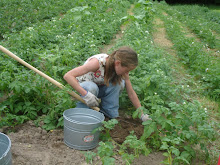
Last week I put my gardens to bed. It's always kind of sad to do this, after I've spent hours and hours out there tilling, planting, weeding, watching things grow, harvesting ect. Now I've picked everything and plowed it under. It looks bleak, one of my good friends calls fall "the season of death".
However, there is one last hoorah of sorts in the end of the growing season; the cover crop. A cover crop is grown for it's fertilizing properties, it's also known as green manure. Green manure is not to be confused with it's cousin, regular manure, which is of course animal poop. Not that there's anything wrong with regular manure it's just stinkier though some folks would argue it's a good stink.
This year I've planted winter wheat as my cover crop. So now I get to watch it sprout and turn green as the leaves and snow fly. Then next spring I'll till it under and thus revitalize the soil, and then it all begins again.
I plant approximatly 40 different varieties of vegetables plus some flowers, herbs and a few berries. Growing a big variety helps protect me from total crop failure. After all, every year is a good year for growing some things and every year is a terrible year for growing other things.
The only downfall of planting a whole lotta different veggies is picking them all out, it's gets a little daunting. But it's a good daunting. Let the seed catalog season begin!
However, there is one last hoorah of sorts in the end of the growing season; the cover crop. A cover crop is grown for it's fertilizing properties, it's also known as green manure. Green manure is not to be confused with it's cousin, regular manure, which is of course animal poop. Not that there's anything wrong with regular manure it's just stinkier though some folks would argue it's a good stink.
This year I've planted winter wheat as my cover crop. So now I get to watch it sprout and turn green as the leaves and snow fly. Then next spring I'll till it under and thus revitalize the soil, and then it all begins again.
I plant approximatly 40 different varieties of vegetables plus some flowers, herbs and a few berries. Growing a big variety helps protect me from total crop failure. After all, every year is a good year for growing some things and every year is a terrible year for growing other things.
The only downfall of planting a whole lotta different veggies is picking them all out, it's gets a little daunting. But it's a good daunting. Let the seed catalog season begin!


